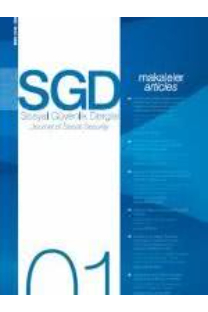Türkiye'de Toplu İş Sözleşmeleri ve Grevlerin İşsizliğe Etkisi: Ekonometrik Bir Yaklaşım1
Ülkelerin en önemli ekonomik sorunları arasında işsizlik ilk sırada yer alır. Genellikle, enflasyon ve faiz oranlarının yüksek olması, dış ticaret açıkları, yatırımların yetersizliği ve benzeri nedenlere bağlı olarak belirlenen işsizlik, daha çok ücret artışlarıyla sonuçlanan toplu iş sözleşmeleri ve grevlerden de olumsuz bir şekilde etkilenir. Özellikle, ekonomik konjonktürün bozulduğu dönemlerde bu etki daha fazla görülür. Bu kapsamda, Türkiye'de toplu iş sözleşmeleri ve grevlerin işsizliğe etkisi, Vektör Otoregresiv (VAR) yöntemi yardımıyla incelenmiştir. 2000 sonrası dönemin ele alındığı çalışmanın bulgularına göre, işsizlik, hem toplu iş sözleşmelerinden hem de bu sürecin etkisiyle ortaya çıkan grevlerden etkilenmiştir.
The Effects of Collective Bargaining and Strikes on the Unemployment in Turkey: An Econometrical Approach
The unemployment takes first place among the most important economic problems of the countries. The unemployment, which is identified due to high inflation and interest rate, foreign trade deficits, the lack of investment and similar reasons is also affected negatively by collective bargaining resulted in wage increases and strikes. This effect is seen especially in the periods of deteriorating economic conjuncture. In this context, the effects of collective bargaining and strikes on the unemployment in Turkey is examined by using Vector Autoregressive (VAR) Method. According to the findings of the study dealing with the period after 2000, unemployment is effected by both collective bargaining and strikes that arising from the effects of this process.
___
- Aidt, Toke ve Zafiris Tzannatos (2002), "Unions and Collective Bargaining, Economic Effects in a Global Environment", Directions in Development, World Bank, Washington.
- Aktakas, Başak Gül (2013), "Post Keynezyen İktisat: Ücret Belirlenimi ve Türkiye Ekonomisi Üzerine Bir Uygulama", Çukurova Üniversitesi Sosyal Bilimler Enstitüsü, Yayımlanmamış Doktora Tezi, Danışman: Prof.Dr. Mehmet Fatih Cin.
- Charezma, Wojciech ve Derek. F. Deadman (1993), New Directions in Econometric Practice USA: Edward Elgar.
- Çetintaş, Hakan; Şenkal, Abdülkadir ve Halit Başel (2008), "Unionization, Unemployment and Economic Growth; Case of Turkey", Serbian Journal of Management, 3(2), 157-170.
- Davidson, Russell ve James G. Mackinnon (1993), "Estimation and Inference in Econometrics", (London: Oxford University Press).
- Demircioğlu, Murat ve Tankut Centel (2009), İş Hukuku, Bireysel İş Hukuku Toplu İş Hukuku, (Gözden geçirilmiş onüçüncü baskı), (Beta Basım, İstanbul) . Dickey, David A. ve Wayne A. Fuller (1979), "Distribution of the Estimates for Autoregressive Time Series with a Unit Root", Journal of the American Statistical Association, 74: 427-431.
- Ebell, Monique ve Christian Haefke (2004), "The Missing Link: Product Market Regulation, Collective Bargaining and the European Unemployment Puzzle", 2004 Meeting Papers, Society for Economic Dynamics.
- Enders, Walter (1995), Applied Econometric Time Series, (New York: John Wiley and Sons Inc).
- Greene, William H. (1993), "Econometric Analysis", 2nd edition Englewood Cliffs, New Jersey Prentice Hall.
- Gujarati, Damodar N. (1995), Basic Econometrics, (3 Baskı), McGraw-Hill,
- Johansen, Soren (1995), "Likelihood Based Inference in Cointegrating Vector Autoregressive Models", (NewYork: Oxford University Press).
- Kayacan, Yalçın (2004), "Grevlerin Ekonomik Etkileri: 1963-2000 Türkiye Örneği", Karadeniz Teknik Üniversitesi Sosyal Bilimler Enstitüsü Yayınlanmamış Yüksek Lisans Tezi, Danışman: Prof. Dr. Rahmi Yamak.
- Lütkepohl, Helmut (1991), "Introduction to Multiple Time Series Analysis", Springer-Verlag, Berlin.
- Nickell, Stephen ve Richard Layard (1999), "Labor Market Institutions and Economic Performance", Handbook of Labor Economics, 1, 3, 46, 3029-3084, Elsevier.
- OECD (1997), Economic Performance and the Structure of Collective Bargaining, Employment Outlook, Paris, [http://www.oecd.org/els/emp/2080431. pdf] (22.03.2013).
- Peker, Osman ve Mehmet Bölükbaş (2012), "An Empirical Analysis of the Factors Determine Unemployment in Turkey", Atatürk Üniversitesi İktisadi İdari Bilimler Dergisi, 26, 3-4, 33-43, Erzurum.
- Pencavel, John (1999), "The Role of Labor Unions in Fostering Economic Development" World Bank Policy Research Working Paper, 1469, 1-27.
- Pesaran, Hashem M. ve Yongcheol Shin (1998), "Generalized Impulse Response Analysis in Linear Multivariate Models", Economics Letters, 58, 17-29,
- Phillips, Peter C. B. ve Pierre Perron (1988), "Testing for a Unit Root in Time Series Regression", Biometrika, 75 (2): 336-346.
- Seyfettinoğlu, Ümit K.; Mert, Mehmet, ve Damla Duman Ayoğlu (2009), "Türkiye'de Grevler ve İşsizlik", I. Sosyal Haklar Uluslararası Sempozyumu, 22-23 Ekim, Akdeniz Üniversitesi, Antalya.
- Sims, Christopher A. (1980), "Macroeconomics and Reality", Econometrica, 48, 1-49.
- Şahin, Hasan (2002), "Poisson Regresyon Uygulaması: Türkiye'deki Grevlerin Belirleyicileri 1964-1998", Doğuş Üniversitesi Dergisi, 5, 173-180.
- TCMB (2013), Elektronik Veri Dağıtım Sistemi, [http://evds.tcmb.gov.tr/cbt.html] (18.03.2013).
- TCMB (2015), Elektronik Veri Dağıtım Sistemi, [http://evds.tcmb.gov.tr/cbt.html] (03.07.2015).
- Traxler, Franz ve Bernd Brandl (2009), "The Economic Effects of Collective Bargaining Coverage: A Cross-National Analysis", Global Union Research Network (GURN), International Labor Organization, Geneva.
- TUİK (2013), İstatistiki Göstergeler, [http://www.tuik.gov.tr/UstMenu. do?metod=istgosterge] (15.03.2013).
- TUİK (2015), İstatistiki Göstergeler, [http://www.tuik.gov.tr/UstMenu. do?metod=istgosterge] (03.07.2015).
- Vedder, Richard ve Lowell Gallaway (2002), "The Economic Effects of Labor Unions Revisited", Journal of Labor Research, 23(1), 105-130.
- ISSN: 2146-4839
- Yayın Aralığı: Yılda 2 Sayı
- Başlangıç: 2011
- Yayıncı: SOSYAL GÜVENLİK KURUMU
Sayıdaki Diğer Makaleler
Ağız ve Diş Sağlığında Yaşam Kalitesi: Diyabet Hastalığının Yaşam Kalitesi Üzerine Etkisi
İç Göç ve Kent ile Bütünleşme: Kocaeli İli Alan Araştırması1
Burcu KÜMBÜL GÜLER, ARZU ÖZSOY ÖZMEN, DOĞA BAŞAR SARIİPEK
Gelecek Nesillerin Yaşam Fırsatları İçin Ciddi Bir Tehdit: Çocuk Yoksulluğu
Türkiye'deki 81 İlin Kamu Tarafından Sunulan Sağlık Hizmetlerine Erişim Durumları
MEHMET GÖZLÜ, Hüseyin TATLIDİL
Özel Hastanelerde Finansal Sıkıntı ve Yeniden Yapılandırma: Adana İlinde Bir Uygulama1
Emel YÜCEL, YILDIRIM BEYAZIT ÖNAL
ENGİN ÜNGÜREN, TAYFUR SÜLEYMAN KOÇ
Türkiye'de Toplu İş Sözleşmeleri ve Grevlerin İşsizliğe Etkisi: Ekonometrik Bir Yaklaşım1
